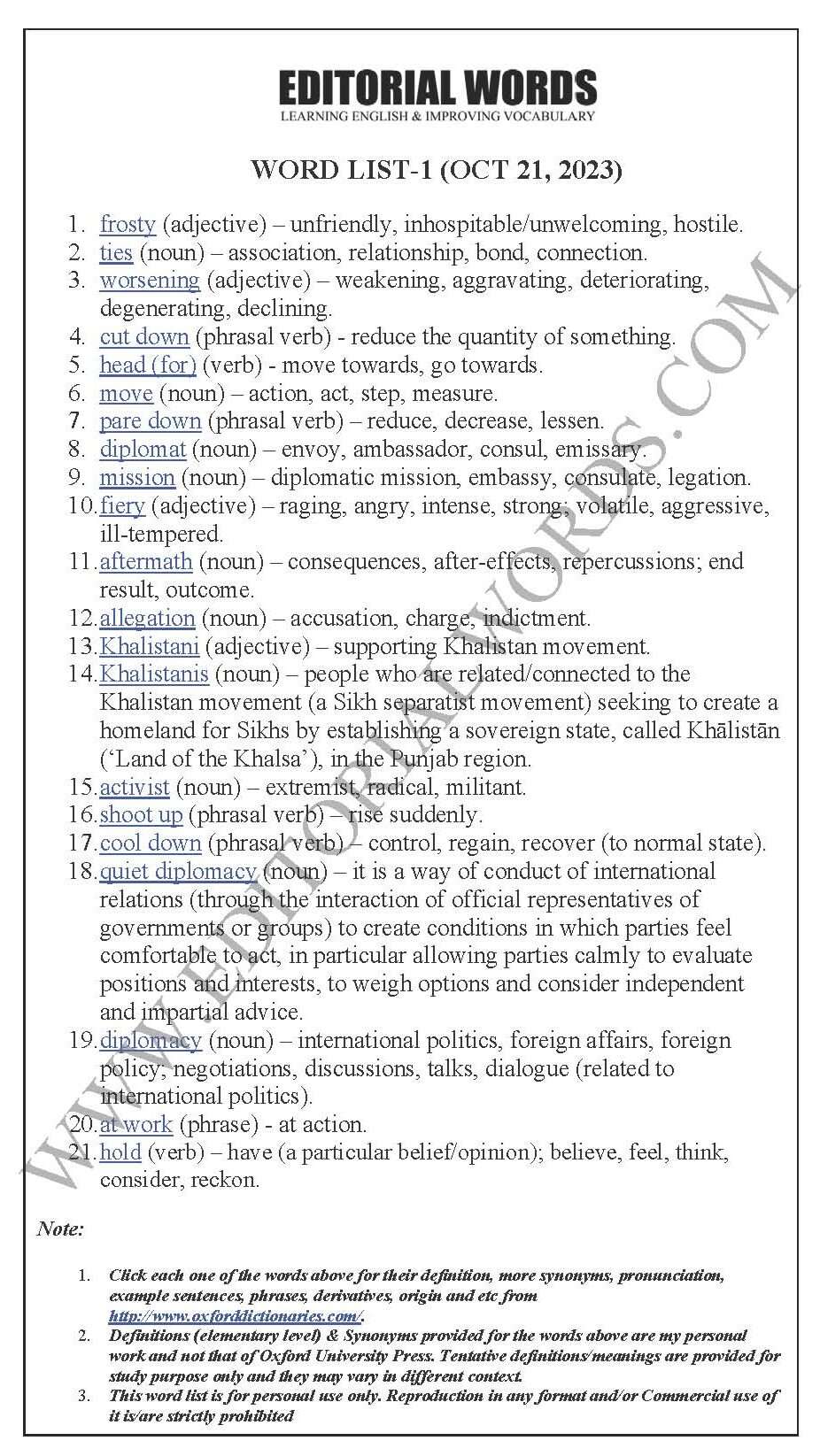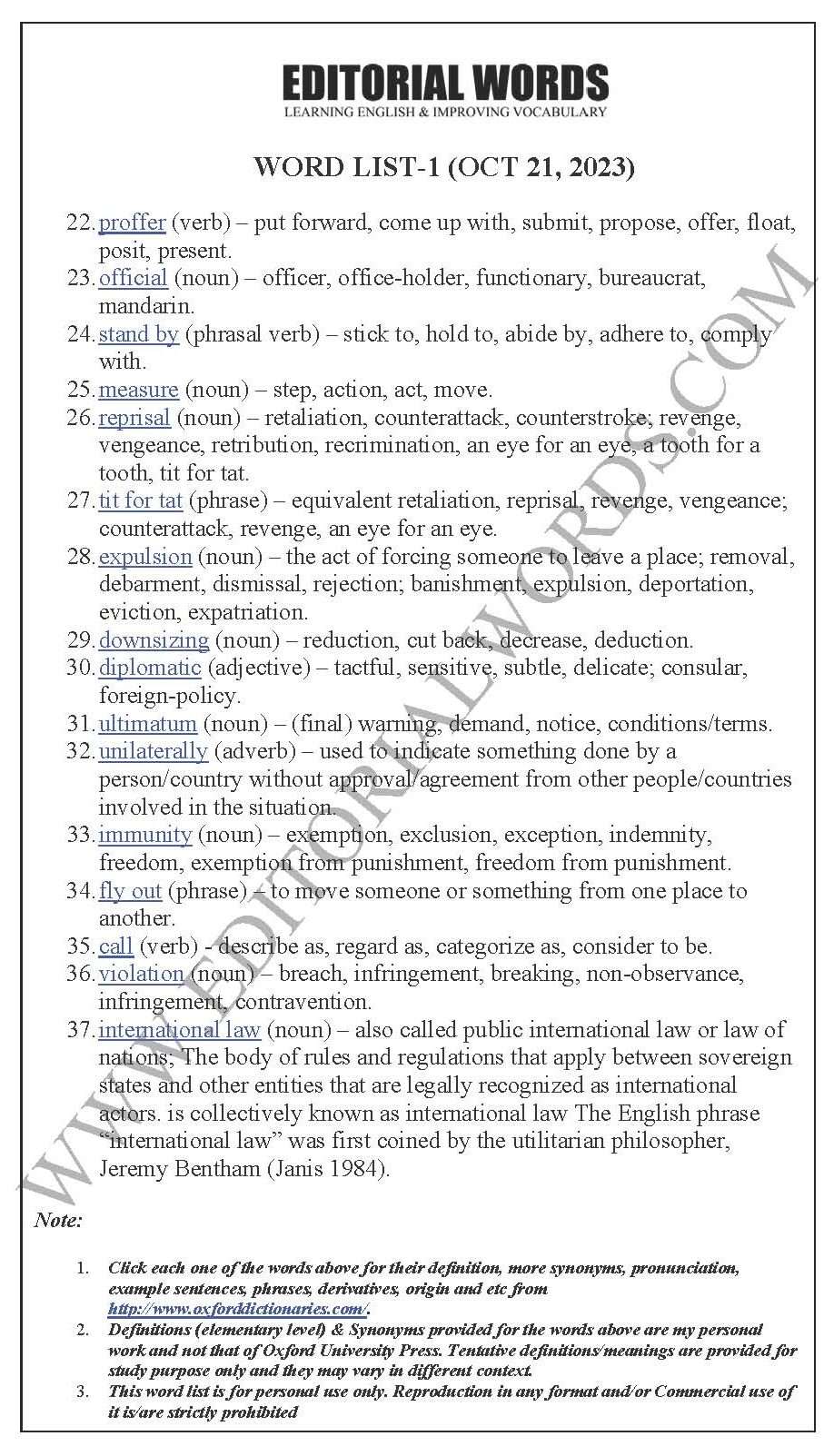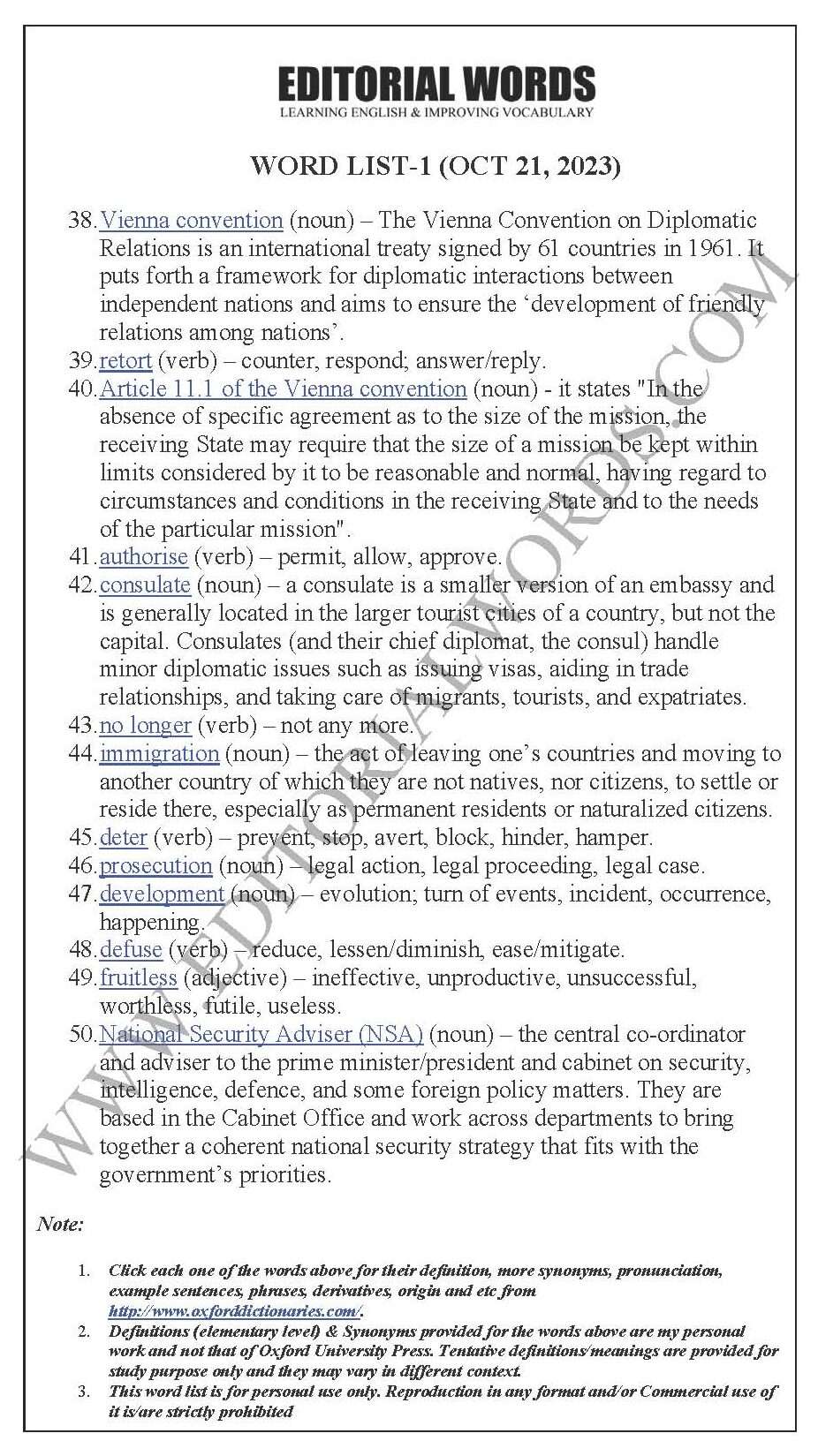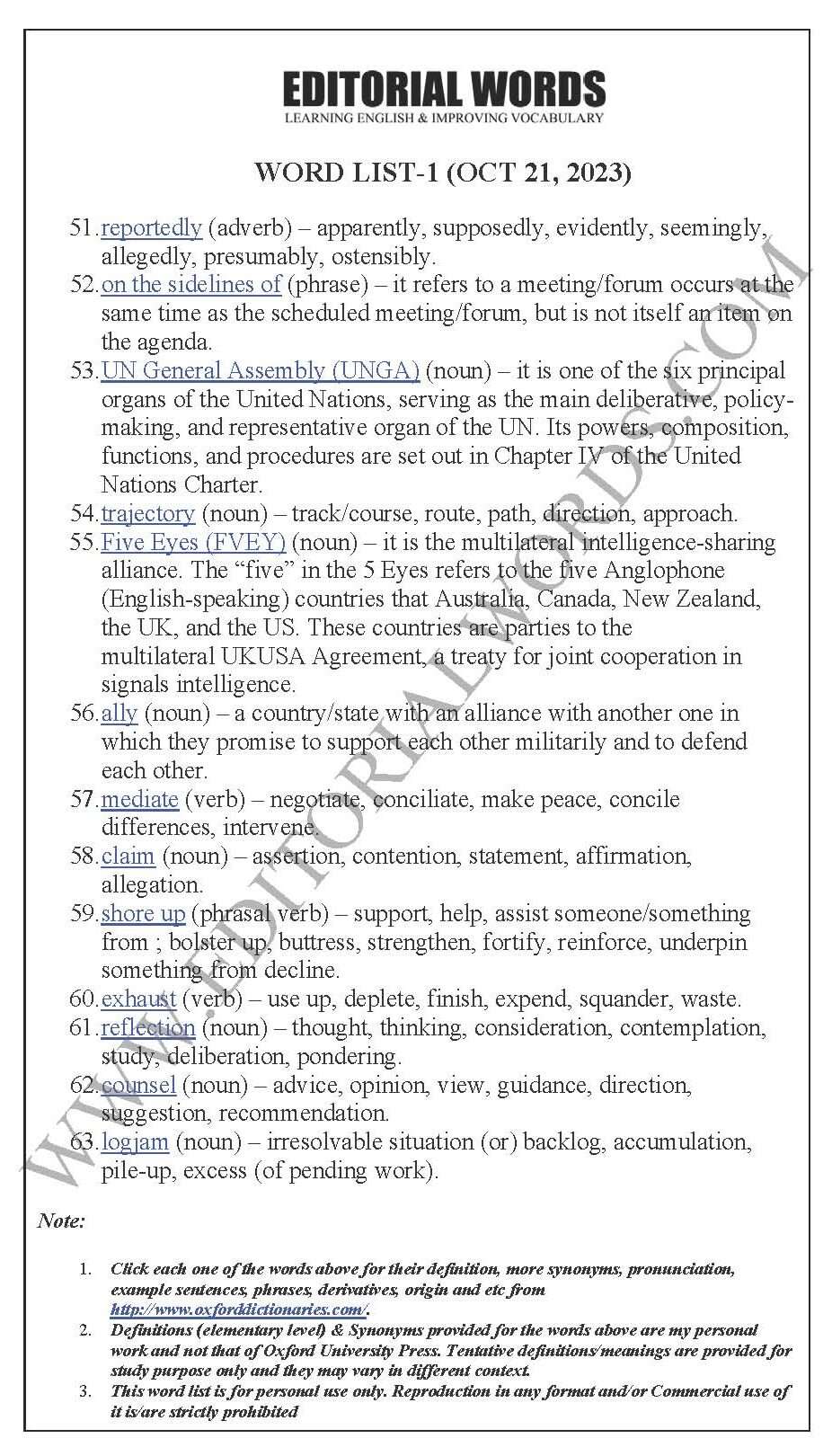The Hindu Editorial (Frosty ties) – Oct 21, 2023
India and Canada are headed for an even frostier season in ties after the Ministry of External Affairs (MEA)’s latest move to pare down the number of Canadian diplomats in India, from 62 to 21… For further reading, visit “The Hindu”. Below is today’s word list-1 for The Hindu Editorial (Frosty ties) – Oct 21, 2023.
To read this article, click “The Hindu”.
This preview is provided here with permission.
Courtesy: The Hindu
The Hindu Editorial (Frosty ties) – Oct 21, 2023:
- frosty (adjective) – unfriendly, inhospitable/unwelcoming, hostile.
- ties (noun) – association, relationship, bond, connection.
- worsening (adjective) – weakening, aggravating, deteriorating, degenerating, declining.
- cut down (phrasal verb) – reduce the quantity of something.
- head (for) (verb) – move towards, go towards.
- move (noun) – action, act, step, measure.
- pare down (phrasal verb) – reduce, decrease, lessen.
- diplomat (noun) – envoy, ambassador, consul, emissary.
- mission (noun) – diplomatic mission, embassy, consulate, legation.
- fiery (adjective) – raging, angry, intense, strong; volatile, aggressive, ill-tempered.
- aftermath (noun) – consequences, after-effects, repercussions; end result, outcome.
- allegation (noun) – accusation, charge, indictment.
- Khalistani (adjective) – supporting Khalistan movement.
- Khalistanis (noun) – people who are related/connected to the Khalistan movement (a Sikh separatist movement) seeking to create a homeland for Sikhs by establishing a sovereign state, called Khālistān (‘Land of the Khalsa’), in the Punjab region.
- activist (noun) – extremist, radical, militant.
- shoot up (phrasal verb) – rise suddenly.
- cool down (phrasal verb) – control, regain, recover (to normal state).
- quiet diplomacy (noun) – it is a way of conduct of international relations (through the interaction of official representatives of governments or groups) to create conditions in which parties feel comfortable to act, in particular allowing parties calmly to evaluate positions and interests, to weigh options and consider independent and impartial advice.
- diplomacy (noun) – international politics, foreign affairs, foreign policy; negotiations, discussions, talks, dialogue (related to international politics).
- at work (phrase) – at action.
- hold (verb) – have (a particular belief/opinion); believe, feel, think, consider, reckon.
- proffer (verb) – put forward, come up with, submit, propose, offer, float, posit, present.
- official (noun) – officer, office-holder, functionary, bureaucrat, mandarin.
- stand by (phrasal verb) – stick to, hold to, abide by, adhere to, comply with.
- measure (noun) – step, action, act, move.
- reprisal (noun) – retaliation, counterattack, counterstroke; revenge, vengeance, retribution, recrimination, an eye for an eye, a tooth for a tooth, tit for tat.
-
tit for tat (phrase) – equivalent retaliation, reprisal, revenge, vengeance; counterattack, revenge, an eye for an eye.
- expulsion (noun) – the act of forcing someone to leave a place; removal, debarment, dismissal, rejection; banishment, expulsion, deportation, eviction, expatriation.
- downsizing (noun) – reduction, cut back, decrease, deduction.
- diplomatic (adjective) – tactful, sensitive, subtle, delicate; consular, foreign-policy.
- ultimatum (noun) – (final) warning, demand, notice, conditions/terms.
- unilaterally (adverb) – used to indicate something done by a person/country without approval/agreement from other people/countries involved in the situation.
- immunity (noun) – exemption, exclusion, exception, indemnity, freedom, exemption from punishment, freedom from punishment.
- fly out (phrase) – to move someone or something from one place to another.
- call (verb) – describe as, regard as, categorize as, consider to be.
- violation (noun) – breach, infringement, breaking, non-observance, infringement, contravention.
- international law (noun) – also called public international law or law of nations; The body of rules and regulations that apply between sovereign states and other entities that are legally recognized as international actors. is collectively known as international law The English phrase “international law” was first coined by the utilitarian philosopher, Jeremy Bentham (Janis 1984).
- Vienna convention (noun) – The Vienna Convention on Diplomatic Relations is an international treaty signed by 61 countries in 1961. It puts forth a framework for diplomatic interactions between independent nations and aims to ensure the ‘development of friendly relations among nations’.
- retort (verb) – counter, respond; answer/reply.
- Article 11.1 of the Vienna convention (noun) – it states “In the absence of specific agreement as to the size of the mission, the receiving State may require that the size of a mission be kept within limits considered by it to be reasonable and normal, having regard to circumstances and conditions in the receiving State and to the needs of the particular mission”.
- authorise (verb) – permit, allow, approve.
- consulate (noun) – a consulate is a smaller version of an embassy and is generally located in the larger tourist cities of a country, but not the capital. Consulates (and their chief diplomat, the consul) handle minor diplomatic issues such as issuing visas, aiding in trade relationships, and taking care of migrants, tourists, and expatriates.
- no longer (verb) – not any more.
- immigration (noun) – the act of leaving one’s countries and moving to another country of which they are not natives, nor citizens, to settle or reside there, especially as permanent residents or naturalized citizens.
- deter (verb) – prevent, stop, avert, block, hinder, hamper.
- prosecution (noun) – legal action, legal proceeding, legal case.
- development (noun) – evolution; turn of events, incident, occurrence, happening.
- defuse (verb) – reduce, lessen/diminish, ease/mitigate.
- fruitless (adjective) – ineffective, unproductive, unsuccessful, worthless, futile, useless.
- National Security Adviser (NSA) (noun) – the central co-ordinator and adviser to the prime minister/president and cabinet on security, intelligence, defence, and some foreign policy matters. They are based in the Cabinet Office and work across departments to bring together a coherent national security strategy that fits with the government’s priorities.
- reportedly (adverb) – apparently, supposedly, evidently, seemingly, allegedly, presumably, ostensibly.
- on the sidelines of (phrase) – it refers to a meeting/forum occurs at the same time as the scheduled meeting/forum, but is not itself an item on the agenda.
- UN General Assembly (UNGA) (noun) – it is one of the six principal organs of the United Nations, serving as the main deliberative, policy-making, and representative organ of the UN. Its powers, composition, functions, and procedures are set out in Chapter IV of the United Nations Charter.
- trajectory (noun) – track/course, route, path, direction, approach.
- Five Eyes (FVEY) (noun) – it is the multilateral intelligence-sharing alliance. The “five” in the 5 Eyes refers to the five Anglophone (English-speaking) countries that Australia, Canada, New Zealand, the UK, and the US. These countries are parties to the multilateral UKUSA Agreement, a treaty for joint cooperation in signals intelligence.
- ally (noun) – a country/state with an alliance with another one in which they promise to support each other militarily and to defend each other.
- mediate (verb) – negotiate, conciliate, make peace, concile differences, intervene.
- claim (noun) – assertion, contention, statement, affirmation, allegation.
- shore up (phrasal verb) – support, help, assist someone/something from ; bolster up, buttress, strengthen, fortify, reinforce, underpin something from decline.
- exhaust (verb) – use up, deplete, finish, expend, squander, waste.
- reflection (noun) – thought, thinking, consideration, contemplation, study, deliberation, pondering.
- counsel (noun) – advice, opinion, view, guidance, direction, suggestion, recommendation.
- logjam (noun) – irresolvable situation (or) backlog, accumulation, pile-up, excess (of pending work).
Note :
1. Click each one of the words above for their definition, more synonyms, pronunciation, example sentences, phrases, derivatives, origin and etc. from http://www.oxforddictionaries.com/.
2. Definitions (elementary level) & Synonyms provided for the words above are my personal work and not that of Oxford University Press. Tentative definitions/meanings are provided for study purposes only and they may vary in a different context.
3. This word list is for personal use only. Reproduction in any format and/or Commercial use of it is/are strictly prohibited.
The Hindu Editorial (Frosty ties) – Oct 21, 2023:




“Phrasal Verbs” We Learnt Last Week
“Idioms & Phrases” We Learnt Last Week
“Important Definitions” We Learnt Last Week
Recent Word Lists For The Hindu Editorial Articles

Be the first to comment